

A powerful and underappreciated ally in the climate crisis? Fungi. If we want to tackle the climate crisis, we need to address a global blindspot: the vast underground fungal networks that sequester carbon and sustain much of life on Earth.
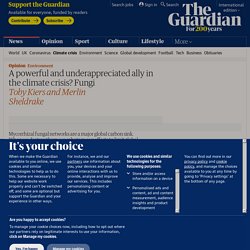
Fungi are largely invisible ecosystem engineers. Climate change fosters terrorism. Apple and Disney among companies backing groups against US climate bill. Some of America’s most prominent companies, including Apple, Amazon, Microsoft and Disney, are backing business groups that are fighting landmark climate legislation, despite their own promises to combat the climate crisis, a new analysis has found.
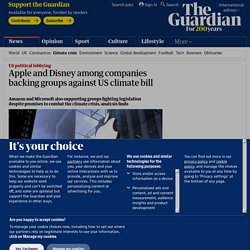
A clutch of corporate lobby groups and organizations have mobilized to oppose the proposed $3.5tn budget bill put forward by Democrats, which contains unprecedented measures to drive down planet-heating gases. The reconciliation bill has been called the “the most significant climate action in our country’s history” by Chuck Schumer, the Democratic leader in the US Senate. Most large US corporations have expressed concern over the climate crisis or announced their own goals to cut greenhouse gases. ‘Cow’s milk without cows’ start-up raises $13m in seed funding. “Cow’s milk without cows” will be in Israeli shops by 2023, after a start-up raised a record $13m (£9.7m) in seed funding from investors to help it make traditional dairy products from microorganisms.
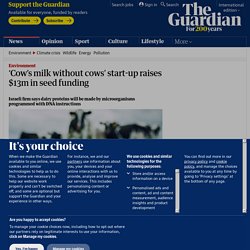
The Tel Aviv-based Imagindairy, which announced its seed funding result on Wednesday, said the milk it produced would be identical to cow’s milk, but the cow, and her associated methane, would be replaced by fungi or other plant microorganisms programmed to produce milk proteins. At its most basic, the programming process involves inserting DNA instructions for the production of whey and casein, the principal milk proteins, into the microorganisms. To turn the whey and casein proteins produced by the microorganisms into cow-free milk and dairy, Imagindairy will add plant-based fat, sugar and water. Methane-free cow’s milk could significantly reduce the impact of climate change and deforestation, NGOs believe. Cutting methane should be a key Cop26 aim, research suggests. Sharp cuts in methane from leaking gas drilling platforms and production sites could play a major role in the greenhouse gas emissions reductions necessary to fulfil the Paris climate agreement, and should be a key aim for the Cop26 UN climate talks, new research suggests.
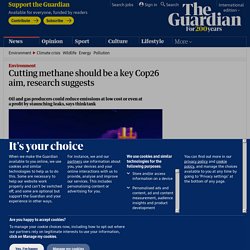
Cutting global emissions of methane by 40% by 2030 is achievable, with most cuts possible at low cost or even at a profit for companies such as oil and gas producers. It would make up for much of the shortfall in emissions reductions plans from national governments, according to the Energy Transitions Commission thinktank. Ahead of Cop26, senior UN and UK officials have privately conceded that the top aim of the conference – for all countries to formulate plans called nationally determined contributions (NDCs), that would add up to a global 45% cut in emissions by 2030 – will not be met. Methane is a powerful greenhouse gas, about 80 times more potent than carbon dioxide in warming the planet. Kowbucha, seaweed, vaccines: the race to reduce cows’ methane emissions. In 2017, Canadian cattle farmers in Alberta started slipping a special ingredient into their animals’ feed.
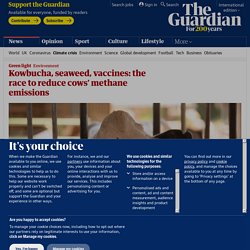
The cows remained oblivious – their forage tasted no different – but by munching on, they had been enlisted into the fight against the climate crisis. The feed, called Bovaer, contained 3-NOP, an organic compound that inhibits cows’ methane production. Farmers ultimately fed the enriched fodder to 15,000 animals and collectively cut their methane emissions by 30% on average and up to 80%. ‘False choice’: is deep-sea mining required for an electric vehicle revolution? At the Goodwood festival of speed near Chichester, the crowds gathered at the hill-climb circuit to watch the world’s fastest cars roar past, as they do every year.
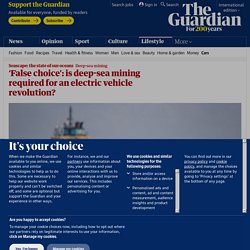
But not far from the high-octane action, there was a new, and quieter, attraction: a display of the latest electric vehicles, from the £28,000 Mini Electric to the £2m Lotus Evija hypercar. Even here, at one of the biggest events in Britain’s petrolhead calendar, it’s clear the days of the internal combustion engine are numbered. As countries strive to meet stringent carbon-emission targets, and vehicle-makers phase out combustion engines, 145m electric vehicles are predicted to be on the roads within a decade, up from 11m last year. The car batteries they require, along with storage batteries for solar and wind power, have sent demand for metals soaring, taking mining firms to the bottom of the sea in the hunt for those metals. Sweden’s green dilemma: can cutting down ancient trees be good for the Earth?
Forest-owner Lars-Erik Levin doesn’t seem like an environmental villain.
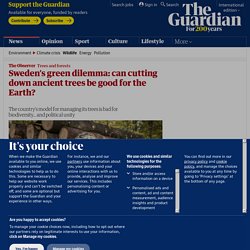
As he walks through his 80 hectares (198 acres) of woodland in southern Sweden, he identifies goldcrests by their song, points out a cauliflower fungus and shows off the aspen in his wood that grouse feed on. Climate crisis: do we need millions of machines sucking CO2 from the air? Does the world need millions of machines sucking carbon dioxide directly out of the air to beat the climate crisis?
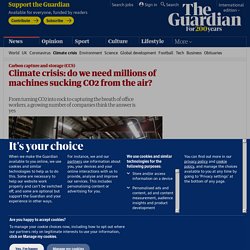
There is a fast-growing number of companies that believe the answer is yes and that are deploying their first devices into the real world. From turning CO2 into rock in Iceland, to capturing the breath of office workers, to “putting oil back underground”, their aim is to scale up rapidly and some have already sold their CO2 removal services to buyers including Bill Gates, Swiss Re, Shopify and Audi.
Prices, however, are sky high – $600 (£440) per tonne and more. Given that humans emit about 36bn tonnes a year, that is problematic. . Direct air capture (Dac), as the technology is known, is challenging in more ways than just financially. The computer chip industry has a dirty climate secret. The semiconductor industry has a problem.
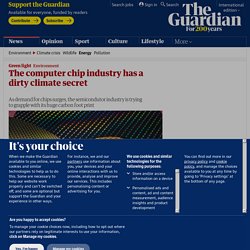
Demand is booming for silicon chips, which are embedded in everything from smartphones and televisions to wind turbines, but it comes at a big cost: a huge carbon footprint. The industry presents a paradox. Meeting global climate goals will, in part, rely on semiconductors. How we talk about the climate crisis is increasingly crucial to tackling it. As the climate emergency creeps closer to the top of the political agenda, where it belongs, an argument is raging over communication.
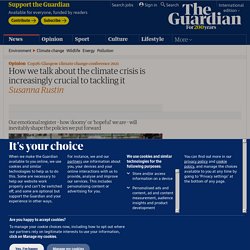
Exactly what to say about the environmental crisis, and how, is an important question for all sorts of people and organisations, including governments. It is particularly pressing for journalists, authors and broadcasters. For us, communication is not an adjunct to other activities such as policymaking or campaigning. It is our main job. UK plastics sent for recycling in Turkey dumped and burned, Greenpeace finds. Turkey has become the latest destination for British plastic waste, which ends up dumped, burned or left to pollute the ocean, a Greenpeace investigation has found. More than half of the plastic the British government says is being recycled are sent overseas, often to countries without the necessary infrastructure to do so. The UK exported 688,000 tonnes of discarded plastic packaging in 2020, a daily average of 1.8m kilos. Just 486,000 tonnes were recycled in the UK.
China was a key destination, but since it banned the import of many types of plastic in 2017, Turkey has emerged as the main receiver of British plastic waste. UK exports to the country increased from 12,000 tonnes in 2016 to 209,642 tonnes in 2020, about 30% of the UK’s plastic waste exports. Animals are our overlooked allies in the fight against Covid. A few weeks ago, I received my first shot of a vaccine against Covid-19. As the newly vaccinated exited the clinic, there was a mix of relief and elation on people’s faces. We exchanged little smiles of solidarity. If we could have burst into spontaneous applause, I’m sure we would have done. There's a simple way to make our cities greener – without a wrecking ball. 'It is the question of the century': will tech solve the climate crisis – or make it worse? Elizabeth Kolbert’s favourite movie is the end-of-the-world comedy Dr Strangelove or: How I Learned to Stop Worrying and Love the Bomb.
For those who need a quick recap, this cold war film features a deranged US air force general who orders a nuclear attack on the Soviet Union using weapons developed by a mad Nazi scientist played by Peter Sellers. A last-minute glitch almost forestalls an apocalyptic war, but a gung-ho B-52 pilot has other ideas. He opens the bomb doors and mounts the H-bomb as if it were a horse, waving his hat and whooping as he rides the missile towards the world’s oblivion. Atlantic Ocean circulation at weakest in a millennium, say scientists. The Atlantic Ocean circulation that underpins the Gulf Stream, the weather system that brings warm and mild weather to Europe, is at its weakest in more than a millennium, and climate breakdown is the probable cause, according to new data.
Further weakening of the Atlantic Meridional Overturning Circulation (AMOC) could result in more storms battering the UK, more intense winters and an increase in damaging heatwaves and droughts across Europe. Scientists predict that the AMOC will weaken further if global heating continues, and could reduce by about 34% to 45% by the end of this century, which could bring us close to a “tipping point” at which the system could become irrevocably unstable. How much is an elephant worth? Meet the ecologists doing the sums. The market won't save us from climate disaster. Global soils underpin life but future looks ‘bleak’, warns UN report.
Global soils are the source of all life on land but their future looks “bleak” without action to halt degradation, according to the authors of a UN report. A quarter of all the animal species on Earth live beneath our feet and provide the nutrients for all food. Soils also store as much carbon as all plants above ground and are therefore critical in tackling the climate emergency. But there also are major gaps in knowledge, according to the UN Food and Agriculture Organization’s (FAO) report, which is the first on the global state of biodiversity in soils. The report was compiled by 300 scientists, who describe the worsening state of soils as at least as important as the climate crisis and destruction of the natural world above ground. Global sustainable fishing initiative agreed by 14 countries. No-kill, lab-grown meat to go on sale for first time. Amazon and Apple 'not playing their part' in tackling electronic waste. More than 3 billion people affected by water shortages, data shows.
A destructive legacy: Trump bids for final hack at environmental protections. Dry run: the wet farming experiment that could sow seeds for future crops. 10 million snowblowers? Last-ditch ideas to save the Arctic ice. Shouldn’t progressives be in favour of people wanting to speak their mind? The US electoral system is a shambles. They could learn a lot from Australia. Getting rid of Trump won't be enough to fix America's broken democracy.
This election isn't about the next four years. It's about the next four millennia. Why this election calls into question whether America is a democracy. No vaccine for cruelty - The pandemic has eroded democracy and respect for human rights. Academic freedom is under threat in Britain. Can big tech ever be reined in? The truth about artificial intelligence? It isn't that honest. The new warrant: how US police mine Google for your location and search history. Covid lies cost lives – we have a duty to clamp down on them. Rethink social media before it's too late. How to deal with free speech on social media. 'Dirty methods' in Brexit vote cited in push for new laws on Europe's elections. How to outsmart fake news in your Facebook feed.
As a whistleblower prepares to speak out, what can be done to rein in Facebook? ‘The whole system is rotten’: life inside Europe’s meat industry. RoboDoc: how India’s robots are taking on Covid patient care. Robots: stealing our jobs or solving labour shortages? Slavery will never be history as long as we turn a blind eye to China. To reverse inequality, we need to expose the myth of the ‘free market’
Billionaire capitalists are designing humanity's future. Don't let them. Violence against women ‘a pandemic’, warns UN envoy. Tributes to Diego Maradona show how easily violence against women is ignored. Lukashenko is a handy villain to mask the cruelty of Fortress Europe.